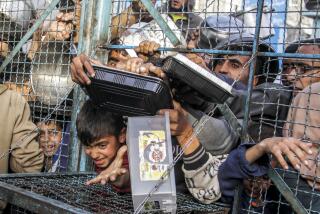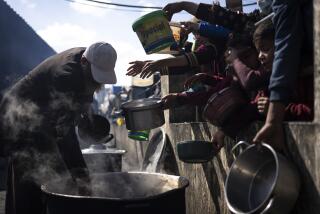Airdrop Readied to Get Food, Aid Into Kosovo
- Share via
NEW YORK — Spurred by reports that some displaced people in Kosovo have been reduced to eating tree bark and leaves, a humanitarian group on Friday said it hopes to begin airdrops next week of relief supplies into the beleaguered province.
“Some 600,000 uprooted Kosovars have been without regular food supplies for nearly two months,” said Reynold Levy, president of the International Rescue Committee--the largest of the U.S. refugee organizations that operate independently of religious affiliation--which is sponsoring the risky operation.
“It is urgent we get supplies to them as soon as possible, and the airdrops represent one useful option for assisting thousands of people in need,” Levy said.
IRC executives said Yugoslav officials accepted “without negative comment” letters outlining the plan the relief organization presented in New York and Belgrade, the Yugoslav capital.
The way for the missions also was paved in quiet discussions between Yugoslav authorities and members of a U.N. humanitarian assessment team that visited Kosovo this month.
The relief group will coordinate its operation with the North Atlantic Treaty Organization, so that the supply planes will not get in the way of alliance airstrikes over Yugoslavia. The cargo will be inspected by a Swiss firm to reassure Yugoslav authorities that no military supplies are being dropped for the rebel Kosovo Liberation Army in the southern province of Serbia, the dominant Yugoslav republic.
The Russian-made planes will be piloted by Moldovan crews who will make two runs daily from Pescara, Italy.
“There are risks. Airdrops are complex and delicate operations,” Levy said at a New York news conference. “They are an imperfect humanitarian tool. But they are worth trying.”
As many as 10 NATO aircraft have been hit by ground fire--two of them crashed--during more than nine weeks of airstrikes on Yugoslavia.
In Brussels, German air force Maj. Gen. Walter Jertz confirmed that IRC officials had conferred with NATO representatives.
“We gave them all the information; we told them that we need all the information to make sure that they are in areas where we know where they are,” he said. “We cannot and will not guarantee them full protection. They know that. They are aware of it.”
IRC officials said that the issue of rescuing any crew members from downed humanitarian planes is delicate and that the organization had received no promises of help from NATO. The alliance has considered and rejected as too dangerous the option of dropping air supplies to displaced Kosovo Albanians.
Jertz stressed that the Yugoslav government is responsible for the security of the flights and must inform its forces in Kosovo of the operation.
The general added that NATO’s European commander, U.S. Army Gen. Wesley K. Clark, had established a “humanitarian airdrop guidance” policy, requiring that organizations seeking to parachute humanitarian supplies into Kosovo give NATO sufficient notice.
“Even if we have this information, we are not protecting them in flight,” he warned.
In Washington, State Department spokesman James P. Rubin said the Clinton administration was “very supportive” of the IRC’s effort.
The committee has received a grant from the U.S. Agency for International Development to help pay the cost of managing the flights, which is estimated at $1 million a month.
“There are risks, but we also think there are gains if the planes can be flown in and tens of thousands of [military] Meals Ready to Eat or humanitarian daily rations can be brought to the people of Kosovo,” Rubin said.
Pentagon officials, however, stressed that the U.S. military was not linked to the humanitarian flights, and they expressed fears the planes would be in grave danger.
“I think it’s not a good idea, frankly, as an airman,” said Air Force Maj. Gen. Charles F. Wald, a senior Pentagon planner. “I think they are putting themselves--from an operational perspective--at great risk.
The issue of providing supplies and care for the hundreds of thousands of ethnic Albanians forced from their homes by Yugoslav forces but still living in Kosovo is highly sensitive for NATO.
Although the Western alliance has accelerated plans to build durable shelters for more than 800,000 Kosovo Albanians who have fled the province, it could face a humanitarian crisis within Kosovo if the air campaign continues for weeks or months, as officials have said it could.
Such a calamity could raise questions about the wisdom of the air war and erode public support for its continuation. The Clinton administration has been searching for an answer for weeks but has found no easy solution to the dilemma.
On Friday, NATO accused the Yugoslav army of halting 28 trucks at Serbia’s border with its smaller sister republic, Montenegro, and confiscating food aid destined for Kosovo. NATO spokesman Jamie P. Shea also said none of the 12 international aid convoys inside Serbia had been allowed into Kosovo.
Levy said his organization has received reports from refugees crossing into Macedonia that the food shortage in Kosovo is so serious that some people have turned to eating leaves and bark.
He said refugees arriving at IRC facilities in the region in recent days have appeared to be in worse physical condition than previous refugees. Some said they had not eaten for two or three days.
To reassure Yugoslav authorities that the planes are dropping 2,000-calorie meals, the IRC has contracted with the Societe Generale de Surveillance, a Swiss company that regularly inspects cargo for the U.N. World Food Program. The firm will assign monitors to check the loading operations and certify that the cargo is exclusively humanitarian. Later plans call for blankets and water to be added.
Skylink Air & Logistics, a Washington-based aviation company, will provide the planes and crews from Moldova for the flights. The firm has conducted missions for U.N. agencies.
The IRC was formed in 1933 with the help of physicist Albert Einstein to help opponents of Adolf Hitler escape from Europe. Over more than six decades, it has resettled more than 250,000 people. Among the former refugees who have left their imprint on America are artists Marc Chagall and Salvador Dali, Nobel Prize winner Elie Wiesel, Intel Chairman Andrew Grove and U.S. Secretary of State Madeleine Albright.
The committee also lobbies to streamline the screening process for people fleeing persecution who seek seeking asylum in the U.S.
*
Times staff writers Paul Richter in Washington and John-Thor Dahlburg in Brussels contributed to this report.
* HUNT FOR WEALTH: The indictment of Yugoslavia’s leader is expected to touch off a global search for his assets. A10
How to Help
The International Rescue Committee is accepting contributions to help with its planned airdrops of relief supplies to Kosovo.
International Rescue Committee
122 E. 42nd St.
New York, NY 10068-1289
(212) 551-3000
IRC Southern California office:
3727 W. 6th St., Ste. 619
Los Angeles, CA 90020
(213) 386-6700
Fax (213) 386-7916
More to Read
Sign up for Essential California
The most important California stories and recommendations in your inbox every morning.
You may occasionally receive promotional content from the Los Angeles Times.













